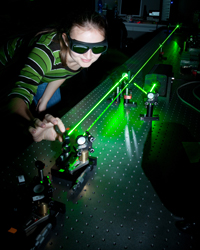EU gets creative to attract science and tech students
The European Union Contest for Young Scientists (EUCYS) was part of the 'Science in society' programme initiated by the European Commission's Directorate-General for Research. With the goal of promoting co-operation and interchange among promising young scientists, this contest gave EU students the chance to mix with others sharing similar interests and to meet some of Europe's leading scientists. The overall aim was to strengthen efforts being made by participating countries to attract its youth to careers in science and technology. The EUCYS2009 project was coordinated by the Commissariat à l'Energie Atomique (CEA) and co-organised by the French National Education Ministry via Sciences à l'École, and by Centre National de la Recherche Scientifique, Palais de la découverte and C. Génial Foundation. Activities concentrated on developing and enhancing a strong interest in natural and social sciences among young students across Europe. Efforts aimed to stimulate creative projects and encourage young European students to follow their interest in science and related career prospects. EUCYS2009 made available scientific prizes comprising week-long visits to some of Europe's leading scientific facilities. This was designed to pique the interest of young scientists in research at top institutes. Ranging in age from 14 to 20, 129 graduates from 32 European and six guest countries took part in the contest. A total of 85 projects, ranked first in 2009 national contests in participating countries, covered biology, chemistry, computer sciences, earth sciences, engineering, environmental sciences, mathematics, physics, medical sciences and social sciences. After oral and written presentations of their work and interviews held during the 2009 Paris Exhibition, high scientific content and originality were celebrated with 30 prizes and special awards given to 25 projects, presented by 37 contestants from 19 countries.



